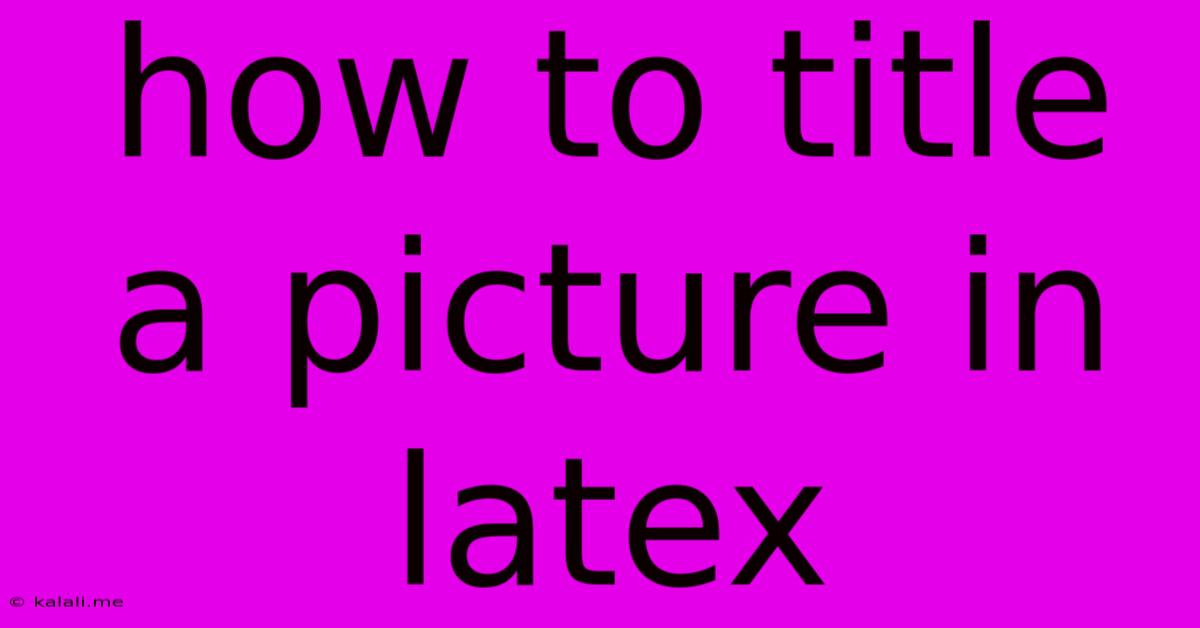How To Title A Picture In Latex
Kalali
May 23, 2025 · 3 min read

Table of Contents
How to Title a Picture in LaTeX: A Comprehensive Guide
This article provides a comprehensive guide on how to effectively title your images within a LaTeX document. We'll cover various methods, from simple captions to more advanced techniques for creating visually appealing and semantically rich image descriptions. This will enhance the readability and accessibility of your work, ensuring both human readers and search engines can easily understand your visuals.
Understanding the Importance of Image Captions in LaTeX
Including descriptive titles for your pictures in LaTeX isn't just about aesthetics; it's crucial for accessibility and SEO. A well-crafted caption provides context for your images, making your document more understandable and improving its overall clarity. Furthermore, search engines use alt text (which is closely related to captions in LaTeX) to understand the content of images, boosting your document's visibility in search results. This is especially relevant if your document is intended for online publication or distribution.
Basic Captioning Using the \caption Command
The most straightforward way to add a title to a figure in LaTeX is by using the \caption command within the figure environment. This command is part of the caption package, which you'll need to include in your document's preamble:
\usepackage{caption}
Here's how you would use it:
\begin{figure}[h!]
\centering
\includegraphics[width=0.8\textwidth]{myimage.png}
\caption{This is the caption for my image.}
\label{fig:myimage}
\end{figure}
This code snippet inserts an image (myimage.png), centers it, and adds the caption "This is the caption for my image." The \label command assigns a label to the figure, allowing you to easily refer to it later in your document using \ref{fig:myimage}.
Advanced Captioning Techniques
While the basic \caption command is sufficient for many situations, LaTeX offers more sophisticated options for customizing your captions:
Multiple Captions:
You might need to provide additional contextual information beyond a simple title. You can achieve this using the \captionof command from the caption package:
\captionof{figure}{Main Caption}
\captionof{figure}{Sub Caption: Additional Detail}
Customizing Caption Appearance:
You can adjust the caption's font, style, and placement using various LaTeX packages and commands. Exploring packages like subcaption, subfig, and float can provide greater control over the layout and appearance of your captions and figures.
Adding Lists and Tables within Captions:
For more complex information, you can even include lists or tables within your captions. This allows you to provide comprehensive descriptions directly below the image.
Using the \listoffigures Command:
The \listoffigures command generates a list of all the figures and their captions in your document, providing a quick overview of the visual content. This is extremely helpful for longer documents.
Best Practices for Writing Effective Image Captions
- Be concise and descriptive: Use clear and precise language to convey the image's content and relevance.
- Use keywords: Integrate relevant keywords that accurately reflect the image's subject matter to enhance search engine optimization.
- Avoid jargon: Use plain language that is easily understandable by a broad audience.
- Maintain consistency: Apply a consistent style and format to all your image captions for a professional look.
- Provide context: Explain the significance of the image within the broader context of your document.
By following these guidelines and exploring the advanced techniques mentioned above, you can create visually appealing and informative figures within your LaTeX documents, significantly improving their overall impact and accessibility. Remember to always prioritize clarity and accuracy in your captions to ensure your message is effectively conveyed to your readers.
Latest Posts
Latest Posts
-
How Long Can You Store Gas In A Can
May 23, 2025
-
Grab An Image Thats Outside Display
May 23, 2025
-
Blender Weird Face Showing Up When Not In Edit Mode
May 23, 2025
-
How Long Is A 1 Hour Walk Through A Jungle
May 23, 2025
-
What Are Books And Movies Considered
May 23, 2025
Related Post
Thank you for visiting our website which covers about How To Title A Picture In Latex . We hope the information provided has been useful to you. Feel free to contact us if you have any questions or need further assistance. See you next time and don't miss to bookmark.